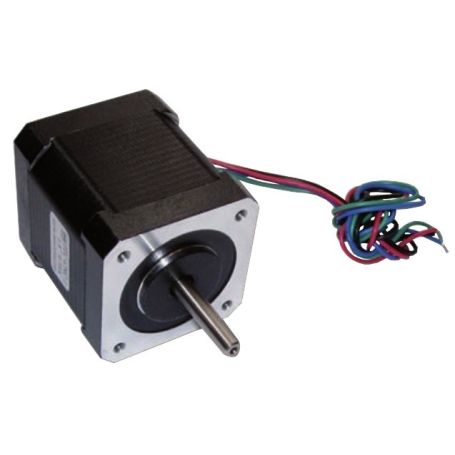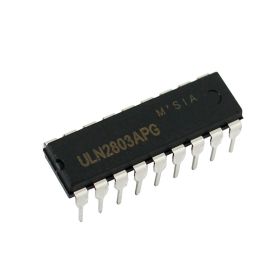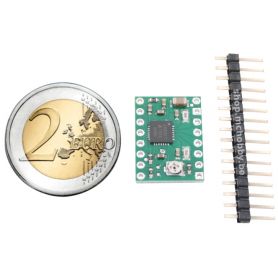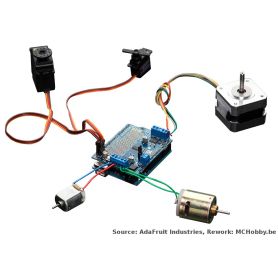[T] - Moteur pas-à-pas - 12V, 200 pas - Pro
A stepper motor, 4 wires, bipolar, 1.8° per step, 200 steps for pro-type applications.
Payments are secured by LyraCollect, a French payment collection company.
It is possible to delivered to your home, to a pick-up point or picked up by appointment at MCHobby
We prepare, pack and ship your orders with great respect and care.
Except stock: available only on request (min 2 pieces), supply 48h. Send your e-mail request to frc@mchobby.be.
Description
Here is a stepper motor that can satisfy all your demanding robotic needs! It's a bipolar 4-wire stepper motor. It has a rotation angle of 1.8° per step allowing smooth movements and has an excellent torque.
If our Hobbyist stepper motor is suitable for all types of applications (even CNC), this motor will be better suited for sustained use and has a longer resting holding torque.
This motor can be used with a MakerBeam Nema 17.
This motor has a maximum current of 400mA and can therefore be controlled using a motor shield for Arduino (or other controller for motor) and a 12V power supply or an acid/lead battery.
Characteristics
- Voltage: 12v
- Current/Phase: 400mA
- Resistance: 30 Ohms
- Inductance/Phase: 55mH
- Holding torque: 43.15 N*cm = 431.5 N*mm = 0.4315 N*m ( 4.4 Kg-cm )
- Number of wires: 4
- Inertia Rotor: 68 gr-cm^2
- Weight: 350gr
- Couple: 200gr-cm
- Without Meplat on the axis
However, you can do it with a Dremel.
1 newton-meter est equal to 100 N-cm, or 10.1971621298 kg-cm (the force exerted by a weight of 10Kg at the end of an arm of 1cm).
General specifications
- Angle: 1.8°/step, 200 steps per revolution
- Accuracy - angle: ~5% (not full, no load)
- Resistance coil - accuracy: ~10%
- Inductance - accuracy: ~20%
- Max temperature: 80°c (rated current, on both coils)
- Operating temperature: -20°C... +50°C
- Insulation resistance: 100MOhms min, 500V DC
- Dielectric: 500 VAC, 30 sec max.
- Radial clearance of the axis: 0.02 max (charge de 450g)
- Axial clearance of the axis: 0.08 max (charge de 450g)
- Max Radial force: 28N
- Max Axial force: 10N
See also the data sheet.











![[T] - Support Nema 17 (moteur pas-à-pas) pour MakerBeam Support Nema (moteur pas-à-pas) pour MakerBeam](https://shop.mchobby.be/388-home_default/support-nema-moteur-pas-a-pas-pour-makerbeam.jpg)
![[T] - Coupleur d'axe 5mm, FLEX, Alu Coupleur d'axe 5mm, FLEX, Alu](https://shop.mchobby.be/547-home_default/coupleur-d-axe-5mm-flex-alu.jpg)
![[T] - Poulie GT2 20T - Courroie 6mm - axe 5mm Poulie GT2 20T - axe 6mm](https://shop.mchobby.be/564-home_default/poulie-gt2-20t-axe-6mm.jpg)

![[T] - Support Nema 17 (moteur pas-à-pas) angle droit Support Nema (moteur pas-à-pas) pour MakerBeam](https://shop.mchobby.be/573-home_default/support-nema-moteur-pas-a-pas-pour-makerbeam.jpg)
![[T] - Coupleur d'axe 5 vers 8mm, FLEX, Alu Coupleur d'axe 5mm, FLEX, Alu](https://shop.mchobby.be/719-home_default/coupleur-d-axe-5mm-flex-alu.jpg)


![[T] - Coupleur/Hub axe 5mm - vis 4-40 Coupleur/Hub axe 4mm - vis 4-40](https://shop.mchobby.be/1082-home_default/coupleurhub-axe-4mm-vis-4-40.jpg)
![[T] - DRV8825 - Stepper motor controller DRV8825 - Controleur moteur pas-à-pas](https://shop.mchobby.be/1142-home_default/drv8825-controleur-moteur-pas-a-pas.jpg)